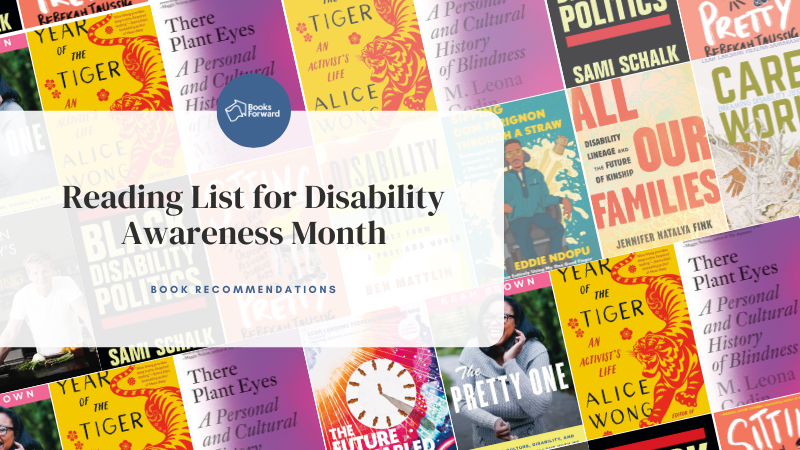When I first moved to New Orleans I was fresh out of college and fumbling my way through becoming a special education teacher. I knew I wanted to do right by my students and that meant leaning in and learning more than I ever could have imagined about disability, more specifically, disability justice.
I turned to my favorite corner of the internet, Bookstagram, where I found thoughtful, passionate, and kind disabled readers that shared books, resources, and lived experiences with me. Without Bookstagram and the fantastic community of disabled readers I definitely would not be where I am in my journey with disability justice (always have room to grow though)!
Below are some books that have shaped my learning around disability justice that I’d highly recommend you check out all year long 🙂

Disability Visibility: First-Person Stories from the Twenty-First Century
This is always my go-to rec, especially if you’re new to disability justice!
One in five people in the United States lives with a disability. Some disabilities are visible, others less apparent–but all are underrepresented in media and popular culture. Activist Alice Wong brings together this urgent, galvanizing collection of contemporary essays by disabled people, just in time for the thirtieth anniversary of the Americans with Disabilities Act.
From Harriet McBryde Johnson’s account of her debate with Peter Singer over her own personhood to original pieces by authors like Keah Brown and Haben Girma; from blog posts, manifestos, and eulogies to Congressional testimonies, and beyond: this anthology gives a glimpse into the rich complexity of the disabled experience, highlighting the passions, talents, and everyday lives of this community. It invites readers to question their own understandings. It celebrates and documents disability culture in the now. It looks to the future and the past with hope and love.
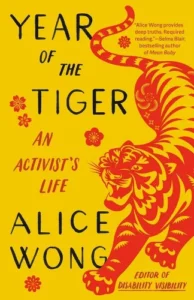
Year of the Tiger: An Activist’s Life by Alice Wong
A fantastic memoir from one of my favorite and most beloved disabled activists, Alice Wong is an incredible force and I’m thankful to be alive in her lifetime.
In Chinese culture, the tiger is deeply revered for its confidence, passion, ambition, and ferocity. That same fighting spirit resides in Alice Wong.
Drawing on a collection of original essays, previously published work, conversations, graphics, photos, commissioned art by disabled and Asian American artists, and more, Alice uses her unique talent to share an impressionistic scrapbook of her life as an Asian American disabled activist, community organizer, media maker, and dreamer. From her love of food and pop culture to her unwavering commitment to dismantling systemic ableism, Alice shares her thoughts on creativity, access, power, care, the pandemic, mortality, and the future. As a self-described disabled oracle, Alice traces her origins, tells her story, and creates a space for disabled people to be in conversation with one another and the world. Filled with incisive wit, joy, and rage, Wong’s Year of the Tiger will galvanize readers with big cat energy.
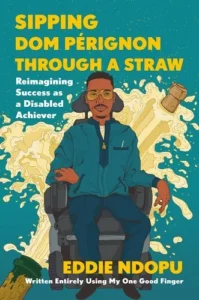
Sipping Dom Pérignon Through a Straw: Reimagining Success as a Disabled Achiever by Eddie Ndopu
If you’re looking for a disabled memoir that really displays the ways in which academia is ableist and classist then you’re going to want to check this one out! Highly recommend it on audio!
A memoir penned with one good finger, Ndopu writes about being profoundly disabled and profoundly successful.
Global humanitarian Eddie Ndopu was born with spinal muscular atrophy, a rare degenerative motor neuron disease affecting his mobility. He was told that he wouldn’t live beyond age five and yet, Ndopu thrived. He grew up loving pop music, lip syncing the latest hits, and watching The Bold and the Beautiful for the haute couture, and was the only wheelchair user at his school, where he flourished academically. By his late teens, he had become a sought-after speaker, traveling the world to address audiences about disability justice.
Ndopu was ecstatic when he was later accepted on a full scholarship into one of the world’s most prestigious schools, Oxford University. But he soon learns that it’s not just the medical community he must thwart– it’s the educational one too.
In Sipping Dom Pérignon Through a Straw, we follow Ndopu, sporting his oversized, bejeweled sunglasses, as he scales the mountain of success, only to find exclusion, discrimination, and neglect waiting for him on the other side. Like every other student, Ndopu tries to keep up appearances–dashing to and from his public policy lectures before meeting for cocktails with his squad, all while campaigning to become student body president. Privately, however, Ndopu faces obstacles that are all too familiar to people with disabilities, yet remain unnoticed by most people. With the revolving door of care aides, hefty bills, and a lack of support from the university, Ndopu feels alienated by his environment. As he soars professionally, sipping champagne with world leaders, he continues to feel the loneliness and pressure of being the only one in the room. Determined to carve out his place in the world, he must challenge bias at the highest echelons of power and prestige. But as the pressure mounts, Ndopu must find his stride or collapse under the crushing weight of ableism.
This evocative, searing, and vulnerable prose will leave you spellbound by Ndopu’s remarkable journey to reach beyond ableism, reminding us of our own capacity for resilience.
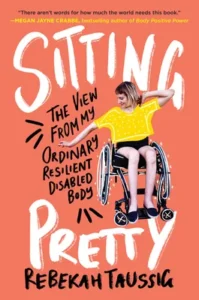
Sitting Pretty: The View from My Ordinary Resilient Disabled Body by Rebekah Taussig
My favorite/ best read of 2023. Rebekah’s writing is concise, unapologetic, and she tackles the struggles of teaching disability justice to young people– something that really resonated with me as I used to be a special education teacher.
Growing up as a paralyzed girl during the 90s and early 2000s, Rebekah Taussig only saw disability depicted as something monstrous (The Hunchback of Notre Dame), inspirational (Helen Keller), or angelic (Forrest Gump). None of this felt right; and as she got older, she longed for more stories that allowed disability to be complex and ordinary, uncomfortable and fine, painful and fulfilling.
Writing about the rhythms and textures of what it means to live in a body that doesn’t fit, Rebekah reflects on everything from the complications of kindness and charity, living both independently and dependently, experiencing intimacy, and how the pervasiveness of ableism in our everyday media directly translates to everyday life.
Disability affects all of us, directly or indirectly, at one point or another. By exploring this truth in poignant and lyrical essays, Taussig illustrates the need for more stories and more voices to understand the diversity of humanity. Sitting Pretty challenges us as a society to be patient and vigilant, practical and imaginative, kind and relentless, as we set to work to write an entirely different story.
This year, I’m challenging myself to read more nonfiction and I’ve made a challenge creatively called the ‘Layne’s 2024 Big Brain Reading Challenge.’ Below are the disability justice books on my list, feel free to play along with me and pick up some of these books in 2024.
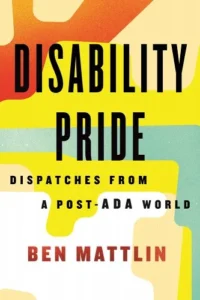
Disability Pride: Dispatches from a Post-ADA World by Ben Mattlin

There Plant Eyes: A Personal and Cultural History of Blindness by M. Leona Godin
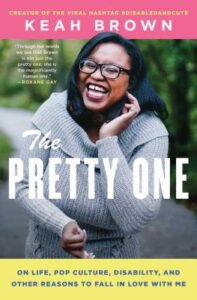
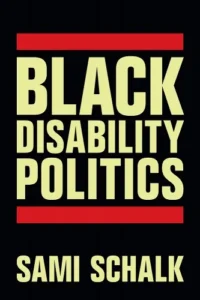
Black Disability Politics by Sami Schalk

Crip Kinship: The Disability Justice & Art Activism of Sins Invalid by Shayda Kafai
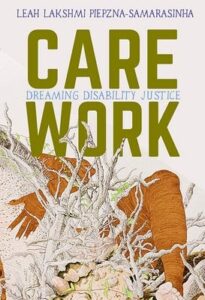
Care Work: Dreaming Disability Justice by Leah Lakshmi Piepzna-Samarasinha
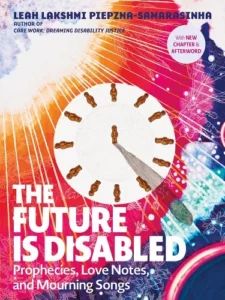
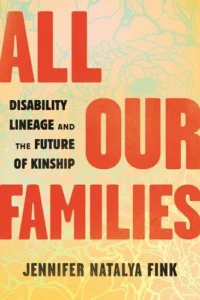
All Our Families: Disability Lineage and the Future of Kinship by Jennifer Natalya Fink

A literary omnivore and influential Bookstagrammer, Layne applies her vivid creativity for every title we promote by deftly coordinating news coverage and events for authors, writing and editing diverse content for social media, and assisting with Books Forward’s social media engagement initiatives.
As a former special education teacher, Layne firmly believes in the importance of literature and accessibility. This unique point of view is an asset in her publicity efforts as she works to reach readers across various platforms and demographics.
Layne received her Bachelors of Arts in Creative Writing and Bachelors of Science in Psychology from Virginia Polytechnic Institute and State University, and her Masters of Art in Teaching from Relay Graduate School of Education. She lives in New Orleans with her loyal, but sadly illiterate cat, Macaroni.
